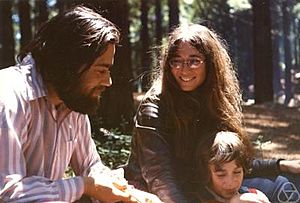Manuel Blum facts for kids
Quick facts for kids
Manuel Blum
|
|
|---|---|

Manuel Blum (left) with his wife Lenore and their son Avrim, 1973
|
|
| Born | 26 April 1938 Caracas, Venezuela
|
| Education | Massachusetts Institute of Technology (BS, MS, PhD) |
| Known for | Blum complexity axioms Blum integer Blum's speedup theorem Blum Blum Shub Blum–Goldwasser cryptosystem Blum–Micali algorithm CAPTCHA reCAPTCHA Commitment scheme |
| Spouse(s) | Lenore Blum |
| Awards | ACM's A.M. Turing Award, 1995 Distinguished Teaching Award, UC Berkeley, 1977 Sigma Xi's Monie A. Ferst Award, 1991 Herbert A.Simon Teaching award, 2007 |
| Scientific career | |
| Fields | Computer science |
| Institutions | University of California, Berkeley Carnegie Mellon University |
| Thesis | A Machine-Independent Theory of the Complexity of Recursive Functions (1964) |
| Doctoral advisor | Marvin Minsky |
| Doctoral students | Leonard Adleman Dana Angluin C. Eric Bach Shafi Goldwasser Mor Harchol-Balter Russell Impagliazzo Silvio Micali Gary Miller Moni Naor Ronitt Rubinfeld Steven Rudich Jeffrey Shallit Michael Sipser Umesh Vazirani Vijay Vazirani Luis von Ahn Ryan Williams |
Manuel Blum is a famous computer scientist who was born in Venezuela in 1938. In 1995, he won the Turing Award, which is like the Nobel Prize for computer science. He received this award for his important work on how computers solve problems and keep information secret. His ideas have helped shape modern computer science.
Contents
Manuel Blum's Education
Manuel Blum grew up in Venezuela. He went to a very famous school called the MIT. At MIT, he studied electrical engineering. He earned his first two degrees there in 1959 and 1961.
Later, in 1964, he earned his highest degree, a Ph.D., in mathematics. His teacher for this important work was Marvin Minsky, another well-known computer scientist.
Manuel Blum's Career
After finishing his studies, Manuel Blum became a professor of computer science. He taught at the University of California, Berkeley until 2001. From 2001 to 2018, he was a special professor at Carnegie Mellon University. His wife, Lenore Blum, who is also a computer scientist, taught there too.
In 2002, he was chosen to be a member of the United States National Academy of Sciences. This is a big honor for scientists in the U.S. In 2006, he also joined the National Academy of Engineering. These memberships recognize his important contributions to computer science.
In 2018, Manuel Blum and his wife Lenore left Carnegie Mellon University. They did this to speak out against unfair treatment. They believed that changes in a project they were involved with led to unfairness towards women.
Manuel Blum's Research and Discoveries
In the 1960s, Manuel Blum created a new way to understand how complex computer problems are. This theory helps scientists measure how much time and memory a computer needs to solve a problem. It works no matter what kind of computer is used.
Some of his other important inventions include:
- A way to "flip a coin" fairly over the phone, even if you can't see the other person.
- The median of medians method, which is a fast way to find the middle number in a list.
- The Blum Blum Shub method, which creates random-like numbers that are very hard to predict. These are useful for computer security.
- The Blum–Goldwasser cryptosystem, a system for keeping digital information secret.
- CAPTCHAs, which are those puzzles you solve online to prove you are a human and not a robot. You've probably seen them!
Manuel Blum is also famous for teaching and guiding many students who became important researchers themselves. Some of his former students include Leonard Adleman, Shafi Goldwasser, Silvio Micali, and Luis von Ahn. These students have also made big contributions to computer science.
See also
 In Spanish: Manuel Blum para niños
In Spanish: Manuel Blum para niños
- List of Venezuelans
- Graph isomorphism problem
- Non-interactive zero-knowledge proof
- Quantum coin flipping
- Pancake sorting
 | John T. Biggers |
 | Thomas Blackshear |
 | Mark Bradford |
 | Beverly Buchanan |

